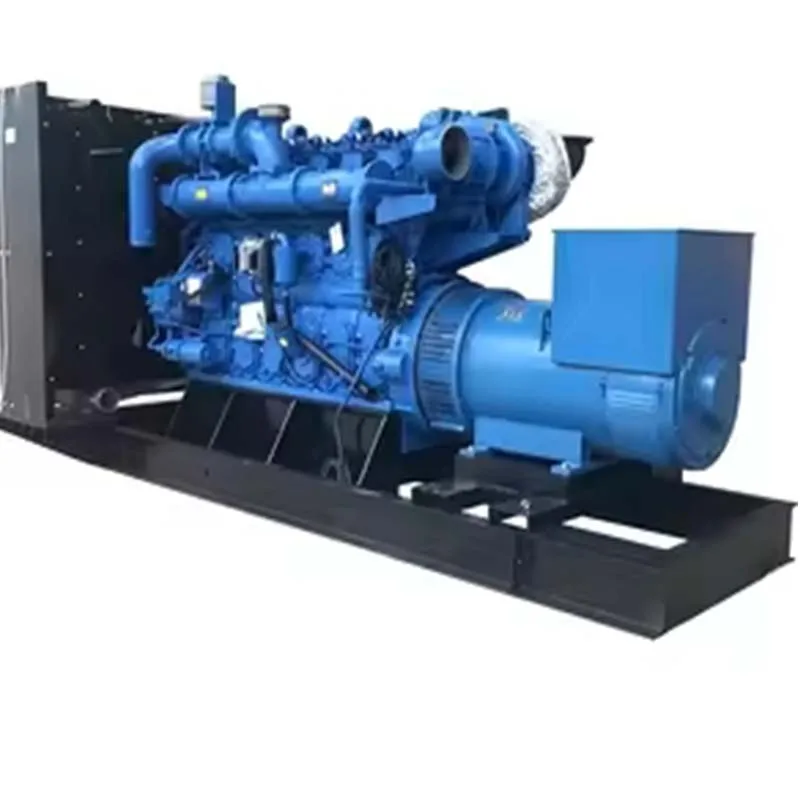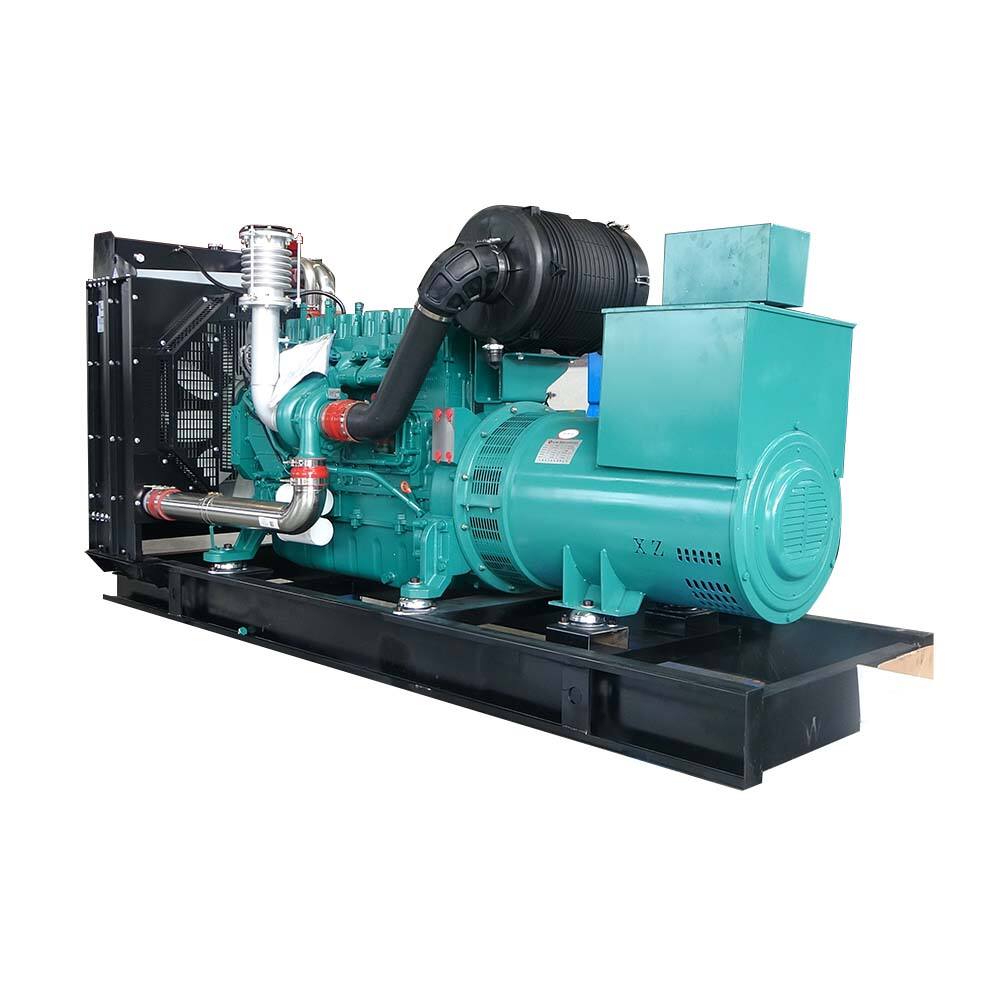The global energy landscape is witnessing unprecedented transformation as businesses and industries increasingly rely on continuous power supply solutions. Modern generator manufacturer companies are at the forefront of this evolution, developing cutting-edge technologies that address the growing demand for reliable, efficient, and environmentally sustainable power generation systems. These manufacturers are revolutionizing how we think about backup power, emergency response, and industrial applications through innovative engineering approaches and advanced fuel technologies.

Industry leaders are focusing on developing comprehensive power solutions that integrate seamlessly with existing infrastructure while providing enhanced performance metrics. The shift toward more sophisticated generator systems reflects the broader industrial trend of digitalization and smart technology integration. Today's generator manufacturer enterprises are not just producing equipment; they are creating complete ecosystems that encompass monitoring, maintenance, and optimization capabilities.
The competitive landscape has intensified as manufacturers strive to differentiate their offerings through technological advancement and customer-centric innovations. This evolution has led to remarkable improvements in fuel efficiency, emission reduction, and operational reliability across various generator categories. From compact residential units to massive industrial installations, the breadth of available solutions continues to expand as manufacturers respond to diverse market needs.
Advanced Natural Gas Generator Technologies
High-Capacity Power Generation Systems
Contemporary natural gas generators represent a significant leap forward in power generation technology, offering capacities ranging from 1000kW to 2000kW for large-scale industrial applications. These systems are engineered to deliver continuous operation capabilities that meet the demanding requirements of manufacturing facilities, data centers, and critical infrastructure installations. The development of these high-capacity units reflects the increasing sophistication of modern industrial operations and their corresponding power demands.
Leading manufacturers have invested heavily in optimizing combustion efficiency and reducing operational costs through advanced engine management systems. These innovations enable precise fuel consumption control while maintaining consistent power output across varying load conditions. The integration of sophisticated monitoring technologies allows operators to track performance metrics in real-time, ensuring optimal efficiency and proactive maintenance scheduling.
The reliability factor has become paramount in generator design, with manufacturers implementing redundant systems and fail-safe mechanisms to ensure uninterrupted operation. Modern natural gas generators feature advanced cooling systems, robust alternator designs, and intelligent load management capabilities that extend operational lifespan while minimizing maintenance requirements. These improvements have made natural gas generators increasingly attractive for applications where continuous uptime is critical.
Environmental Compliance and Emission Standards
Environmental considerations have become central to generator manufacturer strategies as regulatory frameworks tighten worldwide. Natural gas generators offer significant advantages in terms of emission reduction compared to traditional diesel alternatives, producing substantially lower levels of nitrogen oxides, particulate matter, and carbon dioxide. Manufacturers are leveraging these inherent benefits while implementing additional technologies to further minimize environmental impact.
Advanced catalyst systems and precision fuel injection technologies have enabled manufacturers to achieve compliance with stringent emission standards while maintaining performance efficiency. These systems incorporate real-time emission monitoring capabilities that automatically adjust operational parameters to optimize both power output and environmental performance. The result is generator systems that meet or exceed regulatory requirements without compromising reliability or operational effectiveness.
The shift toward cleaner burning fuels has also influenced generator design philosophy, with manufacturers developing engines specifically optimized for natural gas combustion characteristics. These specialized engines feature enhanced compression ratios, modified valve timing, and optimized combustion chamber designs that maximize fuel efficiency while minimizing harmful emissions. Such innovations demonstrate the industry's commitment to sustainable power generation solutions.
Manufacturing Excellence and Quality Standards
Production Processes and Quality Control
Modern generator manufacturer facilities employ sophisticated production methodologies that ensure consistent quality and reliability across all product lines. Advanced manufacturing techniques including computer-controlled machining, automated assembly processes, and comprehensive testing protocols guarantee that each generator meets stringent performance specifications. These facilities integrate lean manufacturing principles with cutting-edge technology to optimize production efficiency while maintaining exceptional quality standards.
Quality assurance programs encompass every stage of the manufacturing process, from raw material inspection to final product testing. Manufacturers implement rigorous testing protocols that simulate real-world operating conditions, ensuring that generators perform reliably under various environmental and operational stresses. This comprehensive approach to quality control has resulted in significant improvements in product reliability and customer satisfaction across the industry.
The integration of Industry 4.0 technologies has revolutionized manufacturing operations, enabling real-time monitoring of production processes and immediate identification of potential quality issues. Smart manufacturing systems utilize artificial intelligence and machine learning algorithms to optimize production parameters continuously, resulting in enhanced product consistency and reduced manufacturing defects. These technological advancements have positioned leading manufacturers at the forefront of industrial innovation.
Supply Chain Management and Global Distribution
Effective supply chain management has become a critical differentiator for successful generator manufacturers in today's competitive marketplace. Leading companies have developed sophisticated supplier networks that ensure reliable access to high-quality components while maintaining cost competitiveness. These networks incorporate risk management strategies that minimize disruption potential while ensuring consistent material availability.
Global distribution capabilities enable manufacturers to serve customers efficiently across diverse geographical markets while providing localized support services. Strategic partnerships with regional distributors and service providers ensure that customers receive timely installation, maintenance, and technical support regardless of their location. This comprehensive approach to market coverage has become essential for maintaining competitive advantage in the global generator market.
Digital supply chain technologies have enhanced visibility and coordination across the entire value chain, enabling manufacturers to respond quickly to changing market demands and customer requirements. Advanced planning systems utilize predictive analytics to forecast demand patterns and optimize inventory levels, ensuring product availability while minimizing carrying costs. These innovations have improved overall operational efficiency and customer responsiveness throughout the industry.
Market Applications and Industry Segments
Industrial and Commercial Applications
The industrial sector represents one of the largest growth opportunities for generator manufacturer companies as businesses increasingly recognize the importance of power continuity for operational success. Manufacturing facilities, chemical plants, and processing operations rely heavily on consistent power supply to maintain production schedules and protect sensitive equipment. The cost of power interruption in these environments often far exceeds the investment required for comprehensive backup power systems.
Data centers and telecommunications facilities have emerged as particularly demanding customers, requiring generators capable of immediate response times and extended operation periods. These applications necessitate sophisticated load management capabilities and seamless integration with existing power infrastructure. Manufacturers have responded by developing specialized generator systems that meet the unique requirements of these critical facilities while providing enhanced monitoring and control capabilities.
Healthcare institutions represent another growing market segment where power reliability is literally a matter of life and death. Hospitals and medical facilities require generator systems that can support critical life support equipment, surgical procedures, and essential medical devices without interruption. The stringent reliability requirements of healthcare applications have driven manufacturers to develop highly redundant systems with multiple backup mechanisms and fail-safe operations.
Emergency Services and Critical Infrastructure
Emergency response organizations and critical infrastructure operators have become increasingly reliant on advanced generator systems to maintain operational capability during natural disasters and other emergency situations. Fire departments, police stations, and emergency communication centers require power systems that can operate independently for extended periods while maintaining full operational capacity. These demanding applications have influenced generator design toward enhanced durability and extended runtime capabilities.
Water treatment facilities and sewage processing plants represent critical infrastructure applications where power interruption can have severe public health and environmental consequences. Generator systems serving these facilities must provide reliable operation under challenging environmental conditions while meeting strict regulatory compliance requirements. Manufacturers have developed specialized systems that address the unique operational challenges of these essential public services.
Transportation infrastructure including airports, seaports, and rail facilities depends on continuous power supply to maintain safety and operational efficiency. These applications often require large-capacity generator systems capable of supporting complex electrical loads including lighting, communications, and safety systems. The integration requirements for transportation infrastructure have led to the development of sophisticated generator systems with advanced control and monitoring capabilities.
Technological Innovation and Future Developments
Digital Integration and Smart Technologies
The integration of digital technologies has transformed generator systems from simple backup power sources into sophisticated energy management platforms. Modern generators incorporate advanced microprocessor controls that enable precise monitoring of operational parameters, automated load management, and predictive maintenance capabilities. These smart systems can communicate with building management systems and utility networks to optimize power usage and reduce operational costs.
Internet of Things connectivity has enabled remote monitoring and control capabilities that allow operators to manage generator systems from virtually anywhere in the world. Cloud-based platforms provide comprehensive analytics and reporting capabilities that help optimize performance, predict maintenance requirements, and minimize operational disruption. These digital innovations have significantly enhanced the value proposition of modern generator systems for customers across all market segments.
Artificial intelligence and machine learning technologies are being integrated into generator control systems to enable autonomous operation and optimization. These systems can learn from operational patterns to predict optimal performance parameters and automatically adjust settings to maximize efficiency and reliability. The implementation of AI-driven technologies represents the next frontier in generator system evolution and promises to deliver unprecedented levels of performance and reliability.
Sustainable Energy Integration
The growing emphasis on renewable energy integration has influenced generator manufacturer development strategies as customers seek solutions that complement solar, wind, and other sustainable power sources. Hybrid systems that combine traditional generators with battery storage and renewable energy sources are becoming increasingly popular for applications requiring both reliability and environmental sustainability. These integrated solutions provide the reliability of traditional generators while reducing overall environmental impact.
Energy storage technologies are being integrated with generator systems to create more efficient and responsive power solutions. Battery systems can provide immediate power response while generators start up, eliminating the traditional delay associated with backup power activation. This integration also enables load leveling capabilities that optimize fuel consumption and reduce operational costs over extended operation periods.
Manufacturers are exploring alternative fuel technologies including hydrogen, biofuels, and synthetic fuels to reduce the environmental impact of generator operations. These emerging fuel technologies offer the potential for carbon-neutral power generation while maintaining the reliability and performance characteristics of traditional generator systems. The development of alternative fuel capabilities represents a significant opportunity for manufacturers to differentiate their offerings in an increasingly environmentally conscious marketplace.
FAQ
What factors should be considered when selecting a generator manufacturer for industrial applications
When selecting a generator manufacturer for industrial applications, several critical factors must be evaluated including production capacity, technical expertise, and service support capabilities. The manufacturer's track record in similar applications provides valuable insight into their ability to deliver reliable solutions that meet specific operational requirements. Additionally, consider the availability of local service support, spare parts inventory, and technical assistance to ensure long-term operational success.
How do modern natural gas generators compare to diesel alternatives in terms of operational costs
Modern natural gas generators typically offer lower operational costs compared to diesel alternatives due to fuel price advantages and reduced maintenance requirements. Natural gas burns cleaner than diesel, resulting in extended maintenance intervals and longer engine life. Additionally, natural gas generators produce fewer emissions, potentially reducing regulatory compliance costs and environmental impact fees associated with diesel operations.
What maintenance requirements are associated with high-capacity generator systems
High-capacity generator systems require comprehensive maintenance programs that include regular engine servicing, electrical system inspections, and cooling system maintenance. Modern systems incorporate predictive maintenance technologies that monitor operational parameters and alert operators to potential issues before they become critical problems. Manufacturer-recommended maintenance schedules should be followed precisely to ensure optimal performance and warranty compliance.
How long can modern generators operate continuously without interruption
Modern generator systems designed for continuous operation can run indefinitely when properly maintained and supplied with adequate fuel. High-quality generators built for industrial applications are engineered to operate continuously for thousands of hours between major maintenance intervals. However, actual runtime depends on factors including load conditions, environmental factors, and adherence to proper maintenance schedules established by the manufacturer.
Table of Contents
- Advanced Natural Gas Generator Technologies
- Manufacturing Excellence and Quality Standards
- Market Applications and Industry Segments
- Technological Innovation and Future Developments
-
FAQ
- What factors should be considered when selecting a generator manufacturer for industrial applications
- How do modern natural gas generators compare to diesel alternatives in terms of operational costs
- What maintenance requirements are associated with high-capacity generator systems
- How long can modern generators operate continuously without interruption

